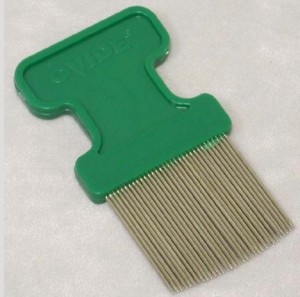This post courtesy of Chris Gonzales, Northeastern IPM Center.
Kids go back to school this season, and this could mean an encounter with head lice. I made a mistake by not consulting an expert before treating my kid for head lice in late August. Don’t repeat my mistake!
I bought the pesticide shampoo because I thought that’s what you were supposed to do. I was wrong. Since then I asked an expert.
According to Consumer Reports, pesticide shampoo for head lice is a $130 million dollar over-the-counter market, and the shampoo likely doesn’t work. Most head lice are resistant to the active ingredient nowadays. Unfortunately, Google search results prominently display advertisements from pesticide sellers, not the free web pages from academic types who say to comb them out.

I contacted Matt Frye, a scientist who specializes in insects at the New York State Integrated Pest Management Program.
“Don’t panic,” he said. “Head lice are not a sign of poor sanitation. Lice are communicable like a common cold. Pesticides are not needed. Instead, comb!”
You can usually find a fine-toothed metal comb for lice on the shelves at drugstores. It’s all you need. The fine teeth are so close together they capture the nits (eggs), nymphs (babies), and lice (adults).
“It is important to be vigilant with combing,” said Frye. “Parents should be aware that they will need to comb thoroughly and systematically at least daily. If this sounds too difficult, seek out the services available where someone will comb your child’s hair.”
For school officials and parents, there’s no need to treat classrooms or homes. Head lice don’t survive long off the body. And there’s no need to pull kids out of school if head lice are found during the day (they’ve already had head lice for a while at that point.)
There was probably little harm in having treated my nine-year-old-boy’s head with pesticide last month. But why take the risk? Mostly it was wasted money and didn’t solve the problem.
I hadn’t had to deal with lice before. I should have searched the website of experts like the New York State IPM Program and the Northeastern IPM Center before heading off to the drugstore!